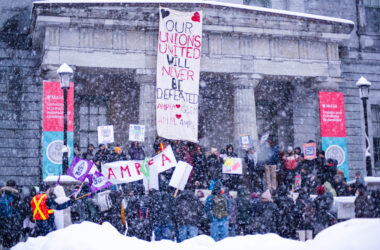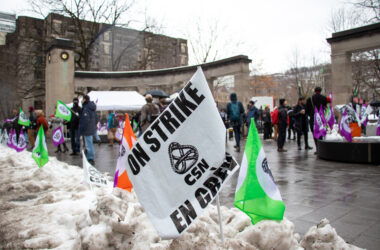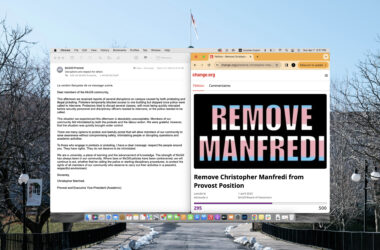On March 27, Principal Heather Munroe-Blum spoke to the McGill Tribune, the McGill Daily and Le Délit about this year’s events and what to look forward to in 2012.
McGill Tribune: Next year will be your last year McGill’s principal. What are your goals for your last term, and what do you hope your legacy will be?
Heather Munroe-Blum: It’s a good time to be thinking about that. Certainly my goals for the coming year are the major planning initiatives that we have underway—the response to the Principal’s Task Force on Diversity, Excellence and Community Engagement; the completion of the next round of academic planning known as the Achieving Strategic Academic Priorities (ASAP) Paper; and integrated with that and parallel to it, the development of the Strategic Research Plan. Those are the places where we, I think, really stand to now take measures, commit ourselves to them, and have some targets that we’ll be reporting back on. And in that regard, the Task Force on Diversity, Excellence, and Community Engagement is really important for me.
The other piece, of course, is the follow-up to the Task Force in my first term, on student life and learning, and although we’ve made progress, I think there’s still ways to go in that. And I guess the other part that’s very important is McGill not just being in Quebec, but of Quebec. You know, we’ve just celebrated our 190th anniversary. We were here before Quebec was a province or Canada was a country, so all the great things about McGill are not just related to what happens within the institution, but where we are.
The McGill Daily: Can you tell us when your potential successors for next year will be announced, and what that process will involve?
HMB: The process is underway, which is why it’s announced quite far in advance. It’s an advisory process to the Chair of the Board, who takes a recommendation to the Board of Governors. There’s a broad representation of the university constituents on the advisory committee: students, admin and support staff, faculty, and alumni. And then they look for the best candidate. All of our leadership searches—for deans, for vice principals, for the principal—are done at the international level, looking for the best candidate.
MT: Following some events this semester, some people have been worried that McGill is a “consequence-free environment.” How would you respond to those people?
HMB: I would say it’s not a consequence-free environment. We’re working very hard to find the right balance between making sure that our core activities are protected, that people are able to do their work, whether it’s students or professors or admin and support staff. And we balance that with the ability for people to express themselves freely, and to demonstrate peaceably. Clearly, there are limits to the latter, and there should not be limits on the ability for people to do their work and carry out their responsibilities here. So there are consequences, and I think we’ve seen some of them in the last week. You know, we’re doing our best to balance this. But I know there’s a concern about this, so you can imagine we’re quite preoccupied with it.
MT: Dean Manfredi’s open forums are a way of allowing people to express themselves. But also last semester you had a live webcast where you answered questions, and you had a blog.
HMB: With [such a] big community … it’s really a challenge to think about how to communicate regularly, not just when there’s something that happens that makes people worried, but all the good things happening too. And it does seem the webcast is a good way to do that … so we’re doing one in April, and then I think the plan is [to do them] again in the fall and the winter.
[In the fall webcast,] far more students than ever in my experience [were] saying, ‘Well what about me? What about my voice, what about my interests and concerns?’ And what we don’t want is an extreme to dominate, whatever that extreme is …We have a very diverse student body, smart, able, dedicated, but a whole range of interests and activities. And so the leadership of the university is very distributed, the elected leadership of the constituent members of the university is very distributed, and we need to very actively continue to pursue how best to have a good alignment of that, that allows for and celebrates diversity, while respecting the place and the mission of the university.
—This interview was edited and condensed by Carolina Millán Ronchetti.








